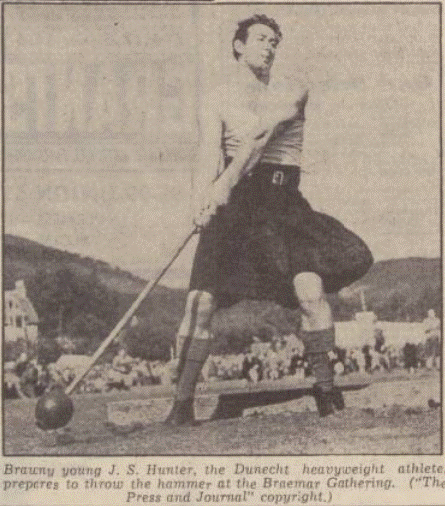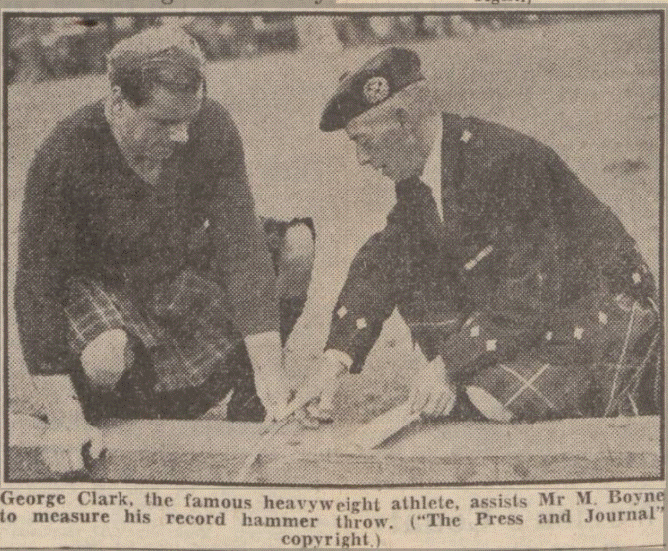The Games were by now well established as one of the major competitions on the circuit and often had their own coverage in the Press less integrated with the numbers and details of high society – although the royal connection still flourished. Press photos now included some, like the one above, of the athletes in action or, at least, of a member of the royal family talking to an athlete, dancer or piper.
By 1950 the War was well over, and the numbers attending were bigger – partly because of the publicity generated by the royal family, partly because of the athletes taking part and because travel was much easier. Given that the Games were held in September in the north of Scotland, the weather was always a factor for everyone attending and the forecast in 1950 from the Met office was for ‘strong west to south-west winds in that area, showers and fair periods. Temperatures as normal.’ In fact the rain stopped as the royal party arrived at 3:00 pm, a rainbow appeared, and as the royal limousine drew up at the pavilion, another shower started. It was a showery afternoon. Nnevertheless they stayed until 5:00 pm having enjoyed the afternoon’s entertainment. The crowd was estimated at 30,000. Just as an earlier Games had been broadcast live by the BBC, they were there again in 1950, this time there was a public showing of colour film of the Games, the film having been made by Norman Brown of Dundee in Edzell and then shown in Auchterarder and other spots as part of talks given by Mr Brown.
The hero of the afternoon’s athletics was again George Clark. The Press & Journal described some of his heroics thus. “George Clark, the well-known Scottish athlete, a mighty figure of a man in the kilt, and winner of the caber tossing competition was presented to their majesties. The King observed that he had seen Clark often at Braemar and was informed by the athlete that he had been performing there for 25 years. It was announced by loudspeaker that Clark would attempt to throw the famous Braemar heavy caber which has never yet been thrown. It measures 21 feet and is of corresponding weight. With the royal party standing by, Clark had two attempts. Each time the caber almost reached the perpendicular but fell back in the wrong direction, the sympathetic groans of the crowd telling that the caber has yet to be successfully tossed.”
The only record set in 1950 was by a deerstalker from Corpach, LK Stewart, when he threw the 16lb Hammer 121′ 10″ which was 2′ 10″ better than the existing record. Shortly before that, he threw the 22lb Hammer in excess of the previous record (distance not specified) by 1′ 1 1/2″ but on the follow-through his fingertip touched the stop board before the Hammer touched the turf – a foul throw. He still won with his second best attempt of 96′ 3 1/2″.
100 Yards Scratch: 1. J Urquhart; 2. J Geddes; 3. JH Gillespie
100 Yards Handicap: 1. J Shepherd; 2. J Urquhart; 3. J Findlay
220 Yards (Local): 1. K Macrae; 2. R Maclean; 3. J Gregor
220 Yards Handicap: 1. J Kennedy; 2. J Malcolm; 3. J Shepherd.
440 Yards (Local): 1. K Macrae; 2. C Campbell; 3. W Anderson
440 Yards Scratch: 1. J Brough; 2. J Geddes; 3. JS Lindsay
Half Mile Scratch: 1. J McIntyre; 2. J Usher; 3. AS Woodhouse
Mile Handicap: 1. W Jack; 2. Craig; 3. J Thomson
Girls Race (Under 16): 1. Elizabeth Briggs; 2. Hazel Anderson; 3. E Anderson
Boys Race (Under 16): 1. R Maclean; 2. J Bruce; 3. N King
16lb Ball: J Hunter 41′ 3″; 2. G Clark; 3. A Stewart
28lb Weight: 1. G Clark 67′ 9″; 2. A Merchant; 3. H Fraser
56lb Weight: 1. G Clark 35′ 2″; 2. H Fraser; 3. J Hunter
Heavy Stone: 1. 1. J Hunter 30′ 7″; 2. G Clark; 3. A Stewart
16lb Hammer: 1. LK Stewart 121′ 10″; 2. G Clark; 3. J Fraser
22lb Hammer: 1. LK Stewart 2. G Clark; 3. J Fraser
Tossing the Caber: 1. G Clark; 2. J Hunter and S Anderson (equal)
Wrestling Cumberland Style: 1. G Clark; 2. J Hunter; 3. R Shaw
Running High Leap: J Davidson; 2. J Scott; 3. J Scott
Running Long Leap: 1. J Scott; 2. HM Herd; 3. J Scott
Vaulting with Pole: 1. HM Hood; 2. J Dodd; 3. I Davidson
George Clark in 1947

